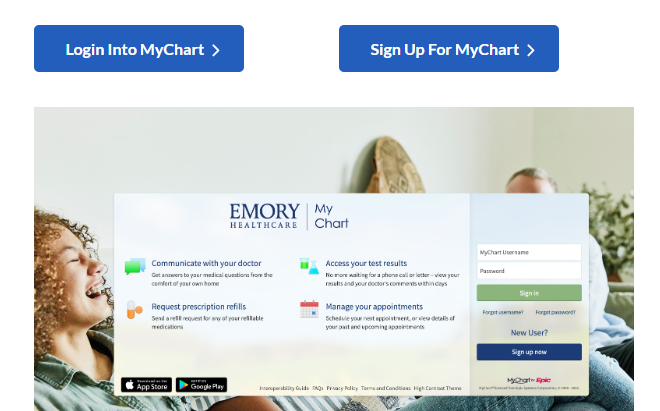Navigating healthcare can sometimes feel overwhelming. However, the Emory Patient Portal simplifies this experience, providing a user-friendly way to manage your health from the comfort of your home. As someone who has utilized the portal, I want to share a comprehensive guide to help you understand its features, benefits, and how to make the most of it.
What is the Emory Patient Portal (MyChart Patient Portal)?
Emory Healthcare has implemented Epic, a new system for electronic health records that includes your MyChart patient portal. This transition to Epic consolidates our multiple patient portals – Emory’s Blue, Gold, HealtheLife, Eye Center, and Emory Decatur portals – into a single platform. If you haven’t done so already, you’ll need to sign up for the MyChart patient portal, even if you have used MyChart with another health system or provider practice. MyChart will replace all existing Emory Healthcare patient portals.
Your MyChart patient portal is user-friendly, allowing you to pay bills, view statements, check in online before appointments, and schedule select appointments. Creating an account is straightforward and typically takes only a few minutes.
Setting Up Your Emory Patient Portal Account
Setting up your account is a straightforward process. Here’s a step-by-step guide:
- Visit the Website: Go to the Emory Patient Portal website.
- Register: Click on the “Sign Up for MyChart” button.
- Verify Identity: Follow the instructions to verify your identity. This may include answering security questions or receiving a verification code via email or phone.
- Create Username and Password: Choose a unique username and a strong password.
- Log In: Use your new credentials to login and start exploring the portal.
Features of the Emory Patient Portal
The portal offers a variety of features to make managing your healthcare easy and convenient:
- Appointment Scheduling: Book, reschedule, or cancel appointments online.
- Medication Management: View current medications and request refills.
- Lab Results: Access test results as soon as they are available.
- Medical Records: View and download your medical history and records.
- Secure Messaging: Communicate directly with your healthcare providers.
- Billing Information: View and pay bills online.
- Health Summaries: Access summaries of your recent visits and treatments.
- Personal Information: Update your personal and contact information.
- Prescription Tracking: Keep track of all your prescriptions.
- Educational Resources: Access a wealth of information about conditions, treatments, and general health.
Top Three Features Explained
1. Appointment Scheduling
Scheduling appointments is no longer a hassle. You can view available slots and book appointments at your convenience. If you need to reschedule or cancel, you can do that too, without having to call the office.
2. Lab Results
Waiting for test results can be stressful. With the Emory Patient Portal, you receive your lab results as soon as they are ready. This means no more waiting for a phone call or letter. You can also compare current and past results to track your health over time.
3. Secure Messaging
Direct communication with your healthcare provider can save you a trip to the office. Whether you have a question about your treatment plan or need clarification on a medication, secure messaging makes it easy to stay in touch with your provider.
Pros of the Emory Patient Portal
- Convenience: Manage your healthcare from anywhere, at any time.
- Immediate Access: Quick access to your health information and test results.
- Time-Saving: Book appointments and request prescription refills without making phone calls.
- Enhanced Communication: Direct messaging with healthcare providers improves clarity and care.
- Eco-Friendly: Reduces the need for paper-based records and communications.
Cons of the Emory Patient Portal
- Technical Issues: Occasionally, users might face technical difficulties or downtime.
- Learning Curve: Some patients may need time to get used to the system.
- Privacy Concerns: Although secure, some patients might worry about the privacy of their online health information.
Centers and Programs of Emory Healthcare
Emory Healthcare offers a variety of centers and programs designed to address a wide range of medical needs. Here are some of the key centers and programs:
1. Winship Cancer Institute
- Overview: Georgia’s only National Cancer Institute-designated comprehensive cancer center.
- Services: Provides cutting-edge cancer treatment, research, and education.
2. Emory Heart & Vascular Center
- Overview: Specializes in the diagnosis and treatment of cardiovascular diseases.
- Services: Offers advanced care including surgery, interventional cardiology, and heart failure management.
3. Emory Brain Health Center
- Overview: Focuses on the comprehensive treatment of brain-related conditions.
- Services: Provides care for neurological, psychiatric, and psychological conditions.
4. Emory Transplant Center
- Overview: Renowned for its expertise in organ transplantation.
- Services: Includes kidney, liver, pancreas, heart, and lung transplants.
5. Emory Orthopaedics & Spine Center
- Overview: Specializes in musculoskeletal care.
- Services: Provides advanced treatments for orthopedic and spine conditions, including surgery and rehabilitation.
6. Emory Eye Center
- Overview: A leading center for eye care and vision health.
- Services: Offers comprehensive eye care including surgeries, treatments for eye diseases, and vision correction.
7. Emory Women’s Center
- Overview: Provides specialized care for women’s health issues.
- Services: Includes obstetrics, gynecology, reproductive health, and breast health services.
8. Emory Sports Medicine Center
- Overview: Dedicated to the treatment of sports-related injuries.
- Services: Offers specialized care for athletes, including injury prevention, treatment, and rehabilitation.
9. Emory Johns Creek Hospital
- Overview: A full-service hospital providing a wide range of medical services.
- Services: Includes emergency care, surgery, maternity services, and more.
10. Emory University Hospital Midtown
- Overview: A comprehensive medical center providing advanced medical care.
- Services: Offers specialized services in cardiology, oncology, neurology, and more.
These centers and programs are part of Emory Healthcare’s commitment to providing high-quality, patient-centered care across a broad spectrum of medical specialties.
The Emory Patient Portal is a free service provided to all patients of Emory Healthcare. There are no costs associated with signing up or using the portal.
Tips for Using the Emory Patient Portal Effectively
- Keep Information Updated: Regularly update your contact information and personal details to ensure you receive all communications.
- Check Regularly: Log in frequently to stay updated on appointments, test results, and messages from your provider.
- Set Reminders: Use the portal’s reminder features to keep track of appointments and medication schedules.
- Explore Resources: Take advantage of the educational materials available to learn more about your health conditions and treatments.
- Stay Secure: Protect your login information and be cautious when accessing the portal on public Wi-Fi networks.
Conclusion
The Emory Patient Portal is a valuable tool for managing your healthcare. Its user-friendly design and comprehensive features make it an excellent resource for staying informed and engaged with your health. Whether you’re booking an appointment, checking test results, or communicating with your provider, the portal offers a seamless experience. If you haven’t yet signed up, I encourage you to do so and take control of your healthcare journey.



